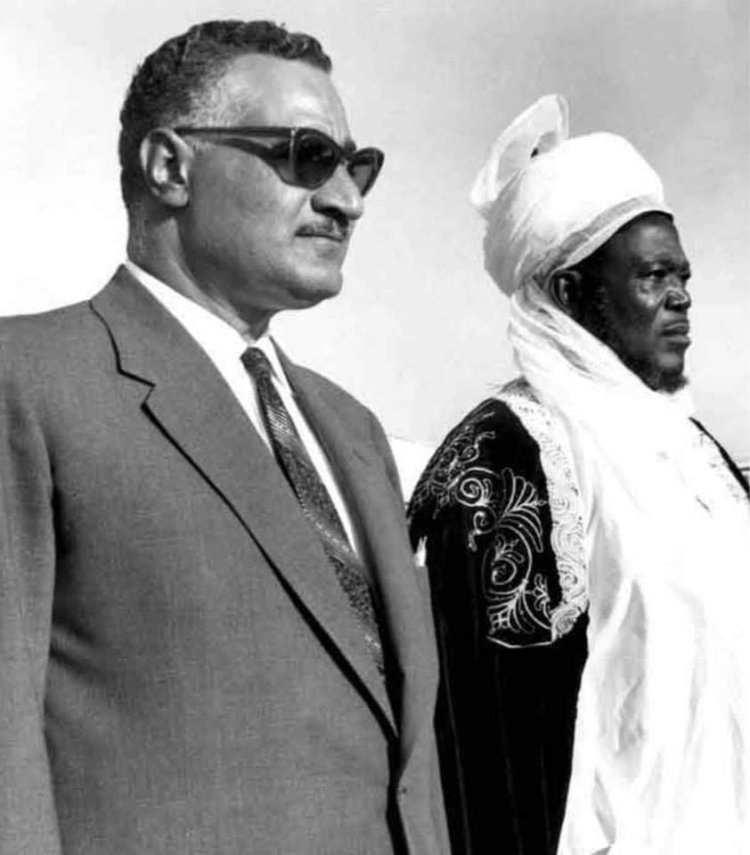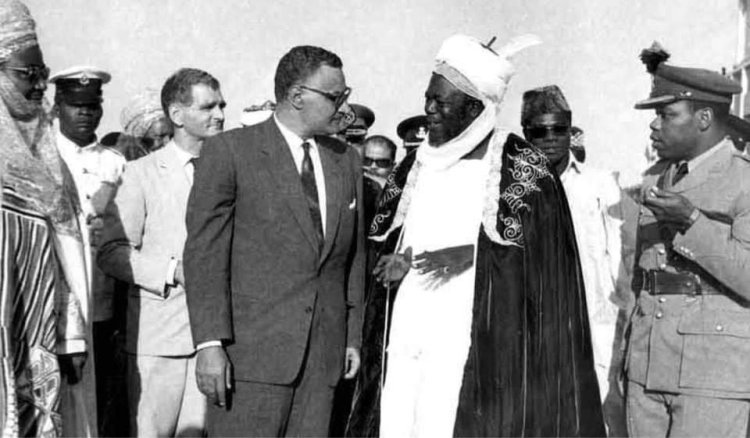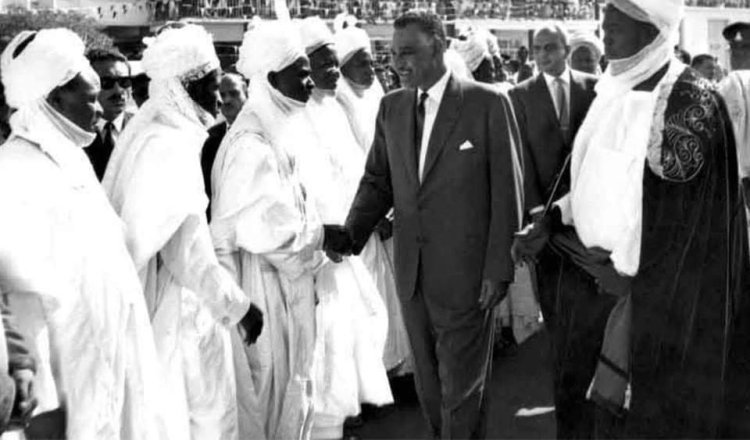When Egyptian Fighter Jets Roamed The Nigerian Sky By Order Of Abdul Nasser
When Egyptian Fighter Jets Roamed The Nigerian Sky By Order Of Abdul Nasser
In July of last year, a painful photo of Nigerian children carrying a tablet that had the Israeli flag on its back circulated social media platforms. As a try to whitewash its heinous act of oppressing the disarmed people of Palestine and as a new infiltration into the African continent, the Israeli Embassy in Nigeria bought and distributed 70 tablets to children displaced near the capital Abuja whose ages ranged between 6-9 years old to learn languages and mathematics. The embassy put the Israeli flag as a background to promote itself.
Looking at what we were and what we have become in Africa left me blue. The majority of states of this continent stood by us on the same front against Imperialism and Zionism, appreciating Egypt's role in supporting them in their national struggles until they gained independence. Egypt did not give up on its role in keeping the unity and integrity of African states even during its most adverse conditions after the 1967 War (An-Naksah or Setback). By doing so, Egypt benefited in various ways: politically, economically and strategically, and kept its national security that stretches down south where the Nile River, the lifeblood, rises.
The Nasser era came to an end upon the death of Naseer who left us a strategic treasure in Africa. However, he was succeeded by Assadat who squandered that treasure by excluding Egypt out of Africa and giving up on its historic role, thus paving the way for the zionist enemy to claim Egypt's position and tamper with its national security especially in Nile River Basin states.
We pause here at a historic event that dates back to 1967 when Egypt responded to Nigeria's call for help despite the pain of the 1967 Setback. This event is narrated by Mr. Mohamed Fayiq, Coordinator of the Egyptian-African Relations during Gammal Abdul Nasser's rule, in his significant work: "Abdul Nasser and Africa's Revolution."
In August of 1967, a few weeks after the 1967 Setback, President Gammal Abdul Nasser received from colonel Yakubu Gowon, President of Nigeria and Head of the Military Council a message in which he showcased the danger posed to his country by the air raids of fighter jets owned by Ojukwo, the leader of the breakaway in the Biafra Region, which bombarded the capital Lagos daily without resistance, thereby creating a state of panic that struck communities and specifically residents of the capital.
Gowon explained in his message that he was able to get a number of Mig-17 fighter jets provided to him by the Soviet Union, but could not find fighter pilots who were able to operate them. Gowon went on saying that he was aware of the severe military conditions that Egypt was going through and Egypt's need for every soldier. He was only hoping that President Gammal Abdul Nasser would use his authority to convince the Algerian president Houari Boumédiene to provide him with a number of Algerian pilots trained to operate his Mig-17s. The message expressed how having those fighter pilots had become a life or death matter.
The Nigerian Civil War was waged when colonel Ojukwo, the military leader of the East Nigeria region, declared the independence of the region as
The Republic of Biafra on the 30th of June, 1967. Ojukwo was able to get some fighter jets operated by some European mercenary pilots, most of which were hired by Tchombe during his breakaway attempt in the Katanga region in Kongo. The danger that the breakaway attempt of the oil-rich Biafra region posed to Nigeria had become extremely similar to that which was posed on Kongo by the breakaway attempts of the mineral-rich Katanga region.
This meant dismantling Nigeria into the rest of the regions that faced a lot of religious, tribal, cultural and political problems especially between the mostly Muslim north and the mostly Christian south. The situation was dangerous as the United States of America stood behind the breakaway to seize control of oil— Where its investments were concentrated— along with English and German establishments which the breakaway met their interests. Thus, firearms supplies flowed onto General Ojukwo, fighter jets arrived along with the European mercenaries, Nigeria appeared to be torn apart and it was all over.
Despite the harsh conditions Egypt faced at the time and Gammal Abdul Nasser's preoccupation with rebuilding the Egyptian armed forces in preparation for the War of Attrition, the latter did not ignore the Nigerian president's message. In fact, Abdul Nasser immediately summoned the African affairs officer, Mohammed Fayiq, and told him: "we don't want our setback to set the rest of Africa back," explaining that Nigeria would not get any fighter pilots from anywhere else and that Egypt itself did not get any response to its similar call during July's Setback. He also explained that sending soldiers is different from sending equipment, warning that the system in Nigeria would not be able to survive and may suffer a defeat against the breakaway forces resulting in the end of the unified state. Biafra gaining independence in that way would create a new entity in the region that can play a role as same as Israel's in the Middle East.
He added that by supporting the breakaway, the US wanted to terrorize the African governments so that they fall in the grip of major capitalist corporations and companies.
Israeli firearms flowing into Biafra might have been an American scheme; However, Israel itself had an interest in the fragmentation of Nigeria, the country hosting the biggest Islamic community in Africa. Added to that was the economic advantages that Israel was aspiring to have there. Egypt should not allow an African setback due to the June of 1967 crisis and that must be a clear basis for Egypt's strategy. Therefore, the decision was to help the federal government resist the breakaway movement in Biafra, keep the unity of Nigeria, respond to its president's request and to send the needed fighter pilots.
At the time, circumstances didn't allow the Egyptian Air Forces to give up a single fighter pilot, yet Abdul Nasser assigned me to recruit retired pilots of the air forces.
The African Affairs Bureau in Egypt inspected the officers and summoned them in batches. As agreed upon with the Nigerian authorities, the operation was to take the form of personal contracts between the personnel and the Nigerian Government in order to avoid international complications resulting from a direct Egyptian intervention.
Though they appeared to be similar to the European mercenaries, portraying these pilots as so was anything but true since they were assigned by the Egyptian Government which arranged these contracts with them and summoned whomever it needed from them.
There was an Egyptian communication officer in Lagos who had direct contact with the African Affairs Bureau in Egypt. He served as a liaison for all that was related to the officers' affairs and was in charge of coordinating with the Nigerian authorities. These officers' motive was first and foremost to serve the Egyptian national objectives— These which met the Nigerian interests.
Mohamed Fayiq proceeds: "I still remember meeting with the first batch of pilots whom I received in to assign this mission to, and how they were mainly interested in knowing the extent to which and how the results of that war would affect us as well as the importance of that to our primary battle with Israel, all without any concern from them about salaries, payments or privileges they were to receive.
As a reward for their service in Nigeria, most of these pilots were called back to active duty afterwards in the Egyptian Air Forces.
After a few days, the first batch of Egyptian pilots commanded by Lieutenant Colonel At-Taliawi arrived at Lagos and they flew the Mig jets at a low altitude in the Nigerian sky on the same day they arrived.
That totally brought Ojukwo's air raids to a stop as the jets he used were not on par with the Russian Mig jets used by the Egyptian pilots.
Mig jets appearing in the sky of Lagos were met by Joy and cheers from its citizens who were terrorized by air raids that had intensified lately then.
The Egyptian pilots' duty was to defend the Nigerian sky in areas specified to them as well as to bombard and totally immobilize the airport that Biafra had, which meant cutting off the mostly airlifted military supplies to Biafra.
The number of Egyptian pilots in Nigeria increased as the war progressed and an aviation institute for training Nigerian pilots was established in Lagos. We had to seek out pilots in the Egyptian Air Forces to achieve the required numbers along with maintenance, ground service and wireless communication teams.
The Minister of Defense, Lieutenant General Mohamed Fawzy wasn't going to be easily convinced of that unless his terms were met. These terms provided for the substitution of personnel every three months and the right to summon all personnel of the Egyptian Air forces who were sent on that mission within 48 hours upon notifying me.
In fact, Lieutenant General Mohammed Fawzy exercised his right to summon the personnel when the War of Attrition escalated.
As for the pilots, those who were out of force in the Egyptian Air Corps stayed and had to multiply their efforts.
Those pilots stayed until the Nigerian Federal Forces triumphed whereas Ojukwo fled to the Cote D'Ivoire, his forces surrendered and the breakaway attempt was extinguished.
Undoubtedly, President Gammal Abdul Nasser's decision to send Egyptian pilots to Nigeria was of big favor to securing the victory for the federal forces.
Egypt didn't burden any costs incurred by helping the federal government during that time. The Nigerian government payed with hard currency for the equipment it received, the majority of which were spare parts, some aircrafts that the Egyptian Air Forces dispensed with, ammunition, aircraft bombs and some other equipment that were easily replenishable through the Soviet Union.
Costs were paid on receipt for the Egyptian Ministry of Defense which used the revenues to buy some of its necessities from European markets with hard currency. These necessities included: continuous tracks required for manufacturing the armored vehicle produced by Egypt and bought from Spain.
The Nigerian Government paid wages and salaries of all Egyptian pilots and technicians who participated in that mission. It also paid with hard currencies costs of air transportation required for quick replenishment operations. Moreover, Egypt had major gains signing economic agreements with Nigeria.
The agreement was that the Nigerian government shall burden all costs incurred by the Egyptian aids due to the circumstances Egypt was dealing with; rebuilding the army and needing to recover all of its resources for the battle with Israel. Nonetheless, Nigeria didn't have a problem regarding its ability to pay. Nigeria's biggest issue in that war was mainly focused on getting the fighter jets and the needed weapons and equipment which it then received from the Soviet Union.
This is how clear Egypt's vision was in its policies in Africa. Amid the harshest of conditions, Egypt hadn't stopped helping Africa and was aware that its acts are an integral part of its battle and arab's battle against colonialism and Israel. Coming to light for the first time is a rare photo collection that was taken during Gammal Abdul Nasser's visit to the fraternal state of Nigeria on the 25th of November, 1965.
Abdelrahman Mohammed Sobhi.




